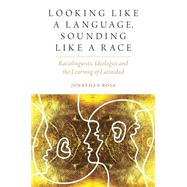Looking like a Language, Sounding like a Race Raciolinguistic Ideologies and the Learning of Latinidad
, by Rosa, Jonathan- ISBN: 9780190634735 | 0190634731
- Cover: Paperback
- Copyright: 1/22/2019
Looking like a Language, Sounding like a Race examines the emergence of linguistic and ethnoracial categories in the context of Latinidad. The book draws from more than twenty-four months of ethnographic and sociolinguistic fieldwork in a Chicago public school, whose student body is more than 90% Mexican and Puerto Rican, to analyze the racialization of language and its relationship to issues of power and national identity. It focuses specifically on youth socialization to U.S. Latinidad as a contemporary site of political anxiety, raciolinguistic transformation, and urban inequity.
Jonathan Rosa's account studies the fashioning of Latinidad in Chicago's highly segregated Near Northwest Side; he links public discourse concerning the rising prominence of U.S. Latinidad to the institutional management and experience of raciolinguistic identities there. Anxieties surrounding Latinx identities push administrators to transform "at risk" Mexican and Puerto Rican students into "young Latino professionals." This institutional effort, which requires students to learn to be and, importantly, sound like themselves in highly studied ways, reveals administrators' attempts to navigate a precarious urban terrain in a city grappling with some of the nation's highest youth homicide, dropout, and teen pregnancy rates. Rosa explores the ingenuity of his research participants' responses to these forms of marginalization through the contestation of political, ethnoracial, and linguistic borders.
Jonathan Rosa's account studies the fashioning of Latinidad in Chicago's highly segregated Near Northwest Side; he links public discourse concerning the rising prominence of U.S. Latinidad to the institutional management and experience of raciolinguistic identities there. Anxieties surrounding Latinx identities push administrators to transform "at risk" Mexican and Puerto Rican students into "young Latino professionals." This institutional effort, which requires students to learn to be and, importantly, sound like themselves in highly studied ways, reveals administrators' attempts to navigate a precarious urban terrain in a city grappling with some of the nation's highest youth homicide, dropout, and teen pregnancy rates. Rosa explores the ingenuity of his research participants' responses to these forms of marginalization through the contestation of political, ethnoracial, and linguistic borders.






